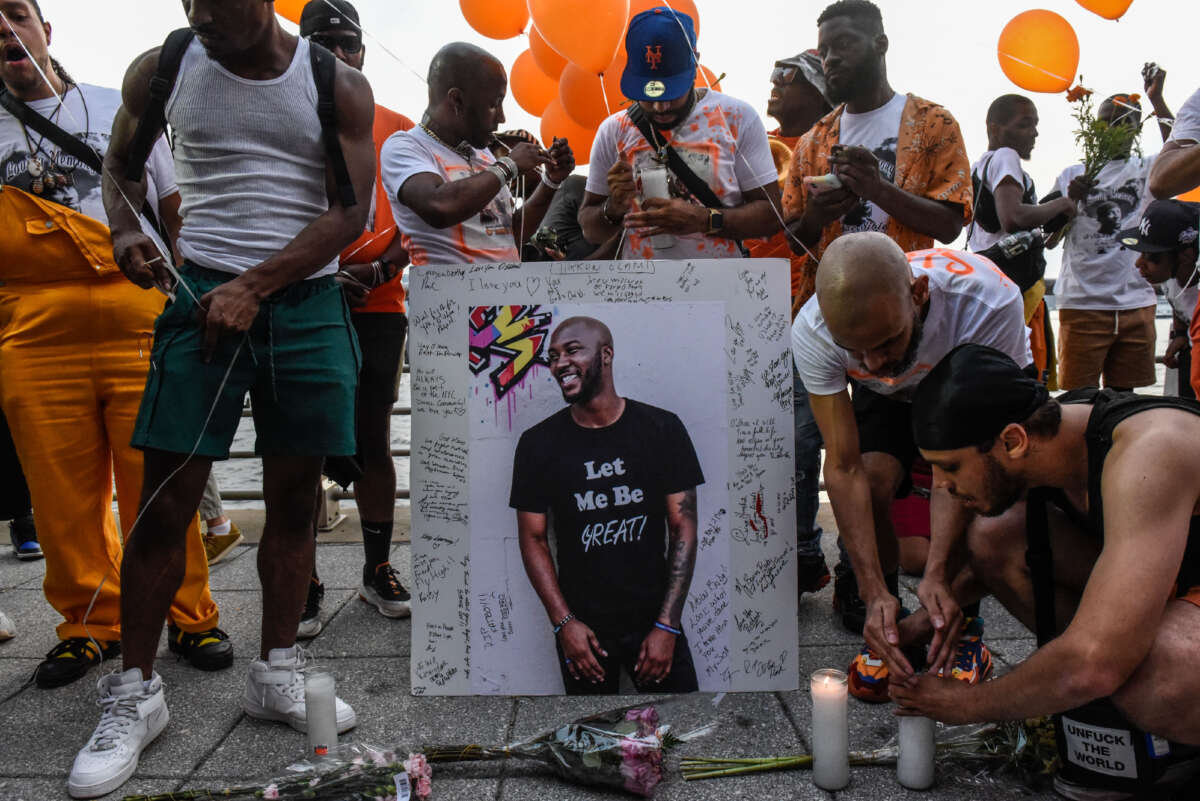Did you know that Truthout is a nonprofit and independently funded by readers like you? If you value what we do, please support our work with a donation.
New Yorkers across the five boroughs recently mourned the life of O’Shae Sibley, a gay Black man killed in Brooklyn while dancing in public. The 28-year-old was returning home from a birthday party with friends before he was stabbed. While stopping for gas, the group began dancing. Beyoncé’s “Renaissance” album played as Sibley and his friends vogued, a dance style created by Black and Latinx queer communities in the 1970s.
Sibley continued this vibrant tradition in his life as a member of the House of Du’Mure-Versailles. Houses are collectives of queer people within a chosen family, emerging as a support system for queer youth, that also provide opportunities to compete in the ballroom dance scene. Sibley was a Philadelphia native and moved to New York during the pandemic to find better dance opportunities, after studying at the Philadelphia Dance Company.
Like generations of LGBTQ+ people before him, Sibley was intrigued by New York’s promise of opportunity to explore the arts and its dazzling LGBTQ+ community. New York emerged as a safe haven for LGBTQ+ people across the country after WWII, in popular neighborhoods like Chelsea, the Lower East Side and Hell’s Kitchen. Dynamic communities and LGBTQ+ art forms either have roots or were influenced by New York City, such as house music, the ballroom scene and the now-iconic vogue dancing style. During the AIDS crisis, the city was the center of LGBTQ+ and AIDS advocacy with the audacious and effective work of ACT UP. Even as gay marriage became legalized across the country, New York City remained a staple in LGBTQ+ cultural life. However, this rich history doesn’t protect LGBTQ+ residents from violence.
While voguing, Sibley and his friends were approached by a group of young men who hurled homophobic and racist slurs. One of the teenage boys then fatally stabbed Sibley. First responders would find Sibley with stab wounds in his torso, and he would later die of his injuries in the hospital. The alleged assailant would later surrender himself to the police a few days later. The murder is being investigated as a racist and homophobic hate crime.
Sibley’s death sent shockwaves throughout New York’s LGBTQ+ community. As I read the report, my heart sank. Like many other LGBTQ+ residents who moved here, the city was supposed to be an escape from homophobic violence. As we witness anti-LGBTQ+ laws rise across the country in conservative states, cities like New York are often lauded as a safe haven, but Sibley’s murder reminds us this isn’t quite the reality. The normalization of violent rhetoric by conservative politicians and a far right movement creates hostility even in the most “gay friendly” spaces. Even though New York State has strong anti-discrimination laws which include LGBTQ+ people, this doesn’t prevent the violence we face, and so nowhere is really safe.
As an openly queer person living in New York City, I can’t escape the fear of anti-LGBTQ+ violence. I do feel more comfortable expressing my sexuality here compared to my home state of Florida, but that doesn’t mean I feel safe. I accept the risk of hostility and violence every time I walk outside with my partner. I confront the glares, and verbal and sexual harassment, and hope to get home safe. This experience is intensified for LGBTQ+ people who are judged as gender nonconforming through subjective assumptions of what a queer person looks or sounds like. LGBTQ+ people are targeted because of their speech patterns, personal style, ways of walking and gender expression. When we proudly enjoy and celebrate aspects of queer culture, like Sibley, we risk our safety.
New York’s LGBTQ+ community has remained steadfast in pushing back against this violence. Memorials and marches were held throughout the city to commemorate Sibley’s life. These demonstrations had tears and signs protesting this injustice, but also space for dance and vogueing, remembering Sibley’s passion. This celebration of his life is a place of resistance, as we refuse to let the murder of a queer person go unnoticed in New York City or anywhere in the country.
LGBTQ+ people across the country are confronting increasing violence in the face of a rising conservative and anti-LGBTQ+ movement. Sibley’s life was lost to hate, as he was dancing with joy and love, in the tradition of vogueing. As we commemorate his death, people across the country remain determined to fight back against anti-LGBTQ+ violence. Let’s create a future in which we no longer need supposed safe havens like New York, so we can enjoy every corner of the country without fear.
Media that fights fascism
Truthout is funded almost entirely by readers — that’s why we can speak truth to power and cut against the mainstream narrative. But independent journalists at Truthout face mounting political repression under Trump.
We rely on your support to survive McCarthyist censorship. Please make a tax-deductible one-time or monthly donation.
